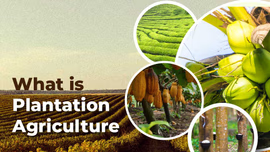What is Apiculture: Meaning, Importance, Methods and Advantages

Table of Contents
- What is Apiculture?
- Scope & Importance of Apiculture in India
- Different Species of Honey Bees in India
- Methods of Apiculture
- Advantages of Apiculture in India
- Factors Affecting Apiculture in India
- Government Initiatives for Beekeeping in India
What is Apiculture?
Apiculture, commonly known as beekeeping, is the practice of raising honey bees for the production of various bee products, such as honey and beeswax. Also, bee keeping is called apiculture, and it involves rearing honey bees for commercial purposes. The apiculture process involves taking care of hives and bees in apiaries. Also, beekeepers can practice apiculture or beekeeping to rear bees for pollination activities. This is because bees are counted among the best pollinators worldwide.
Scope & Importance of Apiculture in India
NITI Aayog estimates the growth of the apiculture market at 4.3% CAGR for 2020-25. Thus, there is a huge scope for higher earnings for Indian beekeepers. In 2022, the total number of registered honey bee colonies on the National Bee Board was 19.34 lakhs, while the total of beekeepers was 12,699. The majority of Indian beekeepers only extract raw honey from their hives.
In 2021-22, India produced 1,33,200 metric tons (MTs) of honey, which showed a 6.56% growth from the previous year. Also, there was a significant improvement in honey export as the total export was 74,413 MTs worth around ₹1,221 crores. This shows the economic importance of beekeeping for Indian economy.
The importance of apiculture in India is due to the fact that it offers an excellent opportunity for more income generation, higher foreign exchange reserves, and healthier yields through cross-pollination.
Different Species of Honey Bees in India
Below are the six species of honey bees found in India:
- Rock bee (Apis dosrata): Known for making large single combs on big trees and open spaces.
- Indian honey bee (Apis cerana): Constructs nests or combs in dark spaces or gaps in walls or tree trunks.
- Little bee (Apis florea): Builds a small comb that is palm-sized in open spaces, like tree branches, small shrubs and bushes.
- European honey bee (Apis mellifera): Most commonly used for producing honey in India commercially.
- Black dwarf honey bee (Apis andreniformis): Known for its limited distribution in high altitude areas of the North East.
- Himalayan Cliff bee (Apis laboriosa): Builds large combs in the cliffs of big Himalayan mountains.
Methods of Apiculture
There are two methods of apiculture: Traditional Method and Modern Method.
Traditional Method
The traditional apiculture method involves two kinds of hives. Wall/Fixed hive is natural as bees make them on any structure like trees or walls. Bees exit the hive through a single opening in the structure. On the other hand, movable hives are built in movable structures like earthen pots and empty boxes. Bees enter and exit these structures from two separate openings.
Honey extraction is done by burning the hive. This is why the traditional method suffers from several challenges. The fire either kills the bees or forces them to escape. Also, the hive is cut and squeezed for honey extraction. It causes contamination from larvae, honey, and pollen cells and thus extracts impure honey.
Modern Method
The development of the modern apiculture method took place to resolve the issues of the traditional method. Improvement in the hive texture was among the first developments of the modern method. Modern methods of apiculture use scientific principles to ensure good bee health and increase the production of honey. Also, modern hive designs allow optimal management of bees.
Movable-Frame Hives: A modern hive is movable, and its dimensions can be changed as per the demands of the climate, season and place. Also, the entire bee colony remains undisturbed as beekeepers can manage frames individually. Some popular hive designs include:
- Newton Model: The brood chamber in the Newton model of hives has 7-10 frames. The frame size is 21 x 14.5 cm. It has a super of size 21 x 6.5 cm to store honey or other products. This model is most common in the East, Central and South India.
- Longstroth hive: There are 10 frames in the Longstroth hive. Its frame size is 44.8 x 23 cm. It is used widely in Punjab, Jammu & Kashmir and Himachal Pradesh.
- Jeolikote hive: This hive type was developed in Jeolikote apiary and is most commonly found in Uttar Pradesh. It has 8 frames with a size of 30 x 18 cm.
The modern apiculture methods offer several benefits.
- Modern methods of apiculture ensure minimum contamination during honey extraction so purer honey is obtained.
- Bee colonies are not disturbed unnecessarily, so the bees remain healthy.
- Proper monitoring of bee activities is possible. Also, there is no need to worry about hive formation frequently, as a single hive can be reused multiple times.
- If the climatic or other conditions are challenging, modern hives can be relocated to a safe location.
- Modern hives also help in controlling the swarming of bees.
- Selective breeding is possible that allows breeding superior species of bees.
Advantages of Apiculture in India
- Pollination Activities: Honey bees transfer pollens among flowers and thus increase the crop yield. They are considered the most effective pollinator across the world. Also, apiculture has a major contribution to forest conservation.
- Nutritious Food Source: Honey is the main product of apiculture farming. It is tasty and nutritious for human consumption.
- Byproducts: The byproducts of apiculture, like royal jelly, pollen and beeswax, are highly valuable for several industries. For example, beeswax is commonly used in cosmetics, pharmaceuticals, and polishing industries.
- Income Generation: Apiculture farming is an important income-generating practice that can also offer additional income to farmers and tribals. It needs minimal land so even farmers with limited land can practice apiculture.
Challenges in Apiculture
- Pesticides are a key input in agriculture. Excessive use of pesticides damages bee colonies by killing honey bees.
- Beekeeping is generally migration or forest based in India. Thus, the honey production is low and cannot fulfil the demands of the people.
- The government mainly focuses on poultry and cattle. There is lack of support for beekeepers for activities like site selection, bee selection, good extraction methods and marketing.
- There is not much awareness among farmers and beekeepers related to the importance and modern methods for extracting good-quality honey.
Government Initiatives for Beekeeping in India
In 2017, Honey Mission was started to promote apiculture and increase bee population and honey production. It also provides training related to beekeeping activities to beekeepers and pest and disease management of bees.
In 2020, the National Beekeeping & Honey Mission (NBHM) was introduced under the AtmaNirbhar Bharat scheme. It aims to achieve the overall growth of the beekeeping industry. This mission has boosted the development of infrastructure through bee disease diagnostic labs, custom hiring centres, and integrated beekeeping development centres (IBDC).
The beekeepers can get the help of NBHM to get technical training, financial support, and market access. The documents required for this scheme include bank details, land documents, DPR and Aadhaar Card. Also, it trains groups of women in beekeeping and offers ₹20,000 to every new group formed. Additional support of ₹5,000 is given to fund the activities of the group.
Wondering how to start a honey bee farm in India? The central government has been motivating people to adopt beekeeping through several programs and initiatives. Apiculture can be an additional source of income for several farmers. They can use the assistance from the government schemes to ensure a profitable beekeeping business.
Frequently Asked Questions On What is Apiculture: Meaning, Importance, Methods and Advantages
1. What is apiculture?
Apiculture or beekeeping is the practice of raising honey bees to produce various bee products, such as honey and beeswax.
2. What are a few products obtained from apiculture?
Products obtained from apiculture are honey, beeswax, pollens and royal jelly.
3. What are the uses of apiculture?
Apiculture is used to obtain a range of bee products, including honey, pollens, royal jelly and beeswax. Also, bees help pollinate plants and increase the yield of seeds or fruits.
4. How is apiculture important in our lives?
Apiculture is a major source of income for many farmers and beekeepers. Also, honey is a popular food product for people. Bee products like beeswax are widely used in cosmetic and polishing products.
5. How is apiculture useful to farmers?
Farmers use apiculture to get several bee products like wax and honey to generate supplementary income.
6. What are the benefits of apiculture?
The benefits of apiculture include pollination, commercial bee products and additional income for farmers.


Related Blogs












